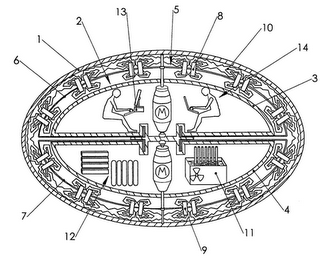8.08.2006
DIY Patents
 Got inventions? Each day, folks in the NewSpace world are hard at work on space innovations for 21st century commercial markets.
Got inventions? Each day, folks in the NewSpace world are hard at work on space innovations for 21st century commercial markets.Who need patents lawyers? Patent your own stuff.
I hope my patent lawyer pals aren't reading this, but if you have an invention that is useful, novel and unobvious, and fits within one of the five statutory categories (process, machine, manufacture, composition of matter, or new use of any of the above), you can get yourself a patent. And you don't have to memorize the Patent Act or rules.
A US patent gives the inventor "the right to exclude others from making, using, offering for sale, or selling" the invention in the US or importing the invention into the US for 20 years from the date on which the application for the patent was filed.
Simple? It can be. In its latest newsletter, Nolo advertises David Pressman's Patent It Yourself, a guide to the not-necessarily-so-mystifying patent process, from conducting a patent search to filing a successful application.
Also available, Nolo's Patents for Beginners by David Pressman & Richard Stim, CD-ROM's, Patent Pending Now! and PatentEase Deluxe 5.0, Richard Stim's Profit From Your Idea: How to Make Smart Licensing Deals, Jack Lander's All I Need Is Money: How to Finance Your Invention, and Nolo's , The Complete Inventor's Kit.
But why buy guidebooks and software? Over at the US Patent and Trademark Office, the feds offer a lot of good, free help for inventors. Dig in. For more than 200 years the PTO has advanced its mission "to promote the progress of science and the useful arts by securing for limited times to inventors the exclusive right to their respective discoveries. (Article 1, Section 8 of the United States Constitution). And yes, you can apply for a patent online.
(However, to enforce your patent rights or bring a patent infringement action, better call a registered patent lawyer.)
I don't see any space companies on the USPTO's list of the 10 companies that received the most U.S. patents in 2005 (Jan. 2006). We'll have to work on that.
Meanwhile, here's a collection of odd, obscure, wacky and patently absurd patents. Thomas Jefferson, the first US commissioner of patents, would be proud.
And you don't have to be an intellectual property lawyer to drop in on some patent law blogs, including Dennis Crouch's popular Patently-O.
Here's a quick quiz: What laws apply to things invented on board the International Space Station? A fun issue. In a tiny nutshell: Under article 8 of the Outer Space Treaty, a state has jurisdiction over objects it launches into space. And the ISS is really just a compilation of nationally-owned modules and elements built by ISS partners. Under the Space Station Intergovernmental Agreement, national laws apply respectively to each module or element. (IGA, Art. 21.) As far as US law goes (other nations' and international patent law will wait for another post), any invention made, used or sold in outer space on board a spacecraft that under jurisdiction or control of the US is considered to be made, used or sold on US territory (35 U.S.C. § 105(2003)). Thus US patent laws apply to US portions of the ISS. And the legal complexity only begins there. Much has been written about IP in space, and I won't delve into all that here. For a talk on space patents and space IP generally, here is a recap of intellectual property lawyer William Hulsey III on The Space Show in February talking about IP rights on earth and beyond, including inventions in outer space, patent trolls and more.
Just remember what a young patent clerk named Albert Einstein once said: Anyone who has never made a mistake has never tried anything new.
* * *
(Image: US Patent 6,960,975 - Space vehicle propelled by the pressure of inflationary vacuum state.
Inventors: Volfson; Boris (Huntington, IN)
Patent Application. No.: 11/079,670
Filed: March 14, 2005)
* * *
UPDATE: Via NASA Watch --
U.S. Patent 6,962,310 - Inflatable satellite bus
Inventors: Bigelow; Robert T. (Las Vegas, NV)
Assignee: Bigelow Aerospace (North Las Vegas, NV)
Filed: November 4, 2004






